Cutthroat capitalist companies dominated the home security industry for many years. They used closed technology that kept consumers confused. Then they deployed aggressive sales teams to lock people into iron-clad multiyear contracts. This article explains why those practices are obsolete. It also clarifies what consumers should avoid when buying a home security system.

Aggressive sales tactics work best when consumers are confused. Big security company sales agents will hammer you with techno-speak to push upsells. The key is to break you down until you give into their terms.
After signing an iron-clad contract, you must also pay an installation fee. Workmen will come to your house, drill holes and set up permanent fixtures.
If you move, the security system stays behind. You will still have to pay the monthly monitoring fee.
Smart home devices disrupt the monopoly
Today, DIY home security systems give consumers more options. These are easy to install and arm. No workmen will come to your house. No contracts required.
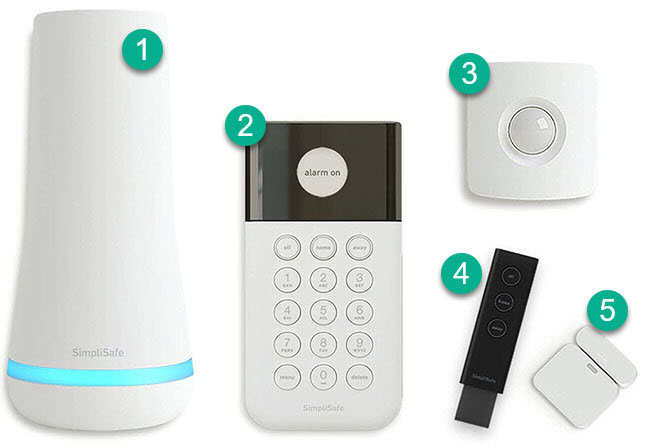
The pictured Simplisafe DIY kit shows the core pieces found in many systems:
- Central hub / siren
- Keypad controller
- Motion sensor
- Keychain fob (for one-click arming or disarming)
- Entry sensor (for doors or windows)
DIY systems work the same way professional big company systems do. Each system contains motion and entry sensors. If sensors detect anything, alarms go off. Notifications go to your phone.
All the big home security companies add mandatory monitoring. If alarms go off, a security rep will call you. If necessary they will call the police.
For this, consumers get locked into 3-year contracts with no cancellation options.
Why traditional home security systems are obsolete
This section highlights the three main reasons professional home security systems are obsolete.

The first reason has to do with the quality of shopping experience. If you buy a traditional system, you must deal with aggressive salespeople. They will try to strong-arm you into an inescapable multiyear payment plan.

In contrast, buying a DIY system is as easy as browsing Amazon. Systems are easy to understand and easy to set up. Instead of a stressful and costly ordeal, it’s a fast, cheap and hassle free experience.
The second reason has to do with costs. Most DIY systems cost less than $200, with no contracts or hidden fees. If you need monitoring services you can pay monthly and cancel any time.
The third reason has to do with the technology itself. Traditional companies use locked technology that doesn’t play nice with other systems. If you want addons, you must buy proprietary ones.
DIY home security systems are much superior because they are extendable. Most are compatible with Amazon Alexa, Google Home, or other voice activiated controllers.
DIY systems can grow as your needs do. You can add cameras, smart thermostats, carbon monoxide detectors, and more.
Samples of obsolete home security packages
Below we analyze three of the top professional home security systems on the market. All three are complicated, expensive and limited.
Compare these to the five best DIY home security starter kits. This adds further proof that DIY systems offer better value for money than traditional pro security.
Vivint Home Security
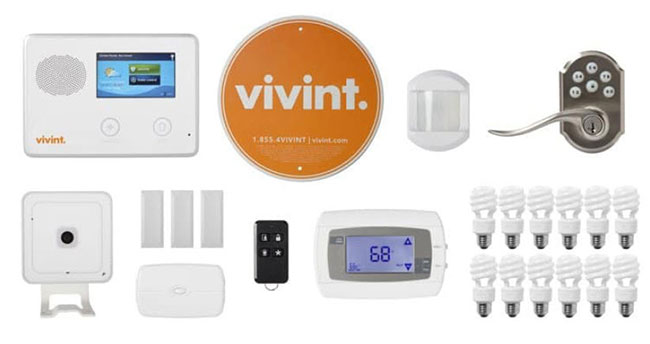
Vivint’s Home Security Systems cost a large fee up-front plus recurring fees. The standard contract length is between 42 to 60 months.
| Package | Equipment Cost | Monthly Cost |
|---|---|---|
| Smart Security | $669.99 | $29.99 |
| Vivint Smart Home | $1379.95 | $39.99 |
| Smart Home with Video | $1,739.93 | $44.99 |
The Smart Security package is basic. It comes with one touchscreen controller, two window/ door sensors and a motion sensor.
The Smart Home Video package comes with the following:
- Indoor, outdoor and doorbell cameras: with built-in night vision; all produce auto-recorded clips.
- Video cloud storage: store your recordings in the cloud and access from any device.
- Smart locks: manage door locks remotely; receive notifications in case of unauthorized entry.
- Remote garage door control: open and close the garage.
- Smart thermostat: adjust temperature from your control panel.
Pros
Vivint systems work well. If you have the cash, they offer a range of home automation extras. These allow you to control your system with a smartphone, computer or the included 7-inch touch-screen.
Cons
For one thing, this company uses deceptive sales practices. Vivint does not list prices on their website. This keeps terms hazy and allows their sales staff free reign push upsells. In 2018, the company paid $10 million to settle a lawsuit for deceptive sales practices. There are also many negative reviews about Vivint online. Some people complain about the complicated and expensive cancellation process. Others gripe about poor customer service.
For another thing, their equipment is ridiculously expensive. DIY home systems offer comparable features for around 80% less money.
ADT Home Security
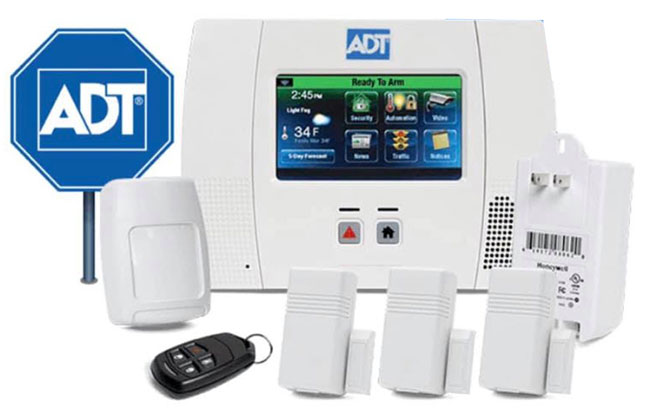
ADT is one of the biggest names in professional home security. Their security systems use high quality components, and their monitoring services are reliable.
On the downside, they are a massive, profit-driven company. A fleet of third-party contractors sell, install and maintain their systems. Consumers need to be diligent and skeptical to make sure they get solutions best for their needs.
All packages include these components:
- Digital keypad: arm or disarm the system
- Three door or window sensors
- One motion sensor
- High decibel alarm
- Wireless keychain: activate or disarm the system from a remote location
How ADT Security works
If the sensors go off, your alarm will sound. You can choose between a high decibel alarm or a silent signal sent to ADT. If the latter, an ADT rep will call you through the control panel, or your designated number.
There are three basic packages. Each comes with many options:
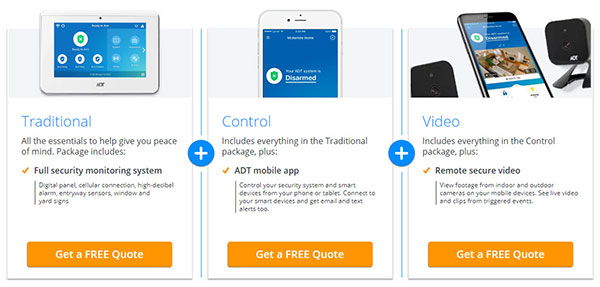
| Plan | Monthly Price | Connection Type |
|---|---|---|
| Basic security | $27.99 | Landline phone |
| Basic security with Wireless | $48.99 | Landline phone |
| ADT Pulse Monitoring with Video | $58.99 | Cellular |
| ADT Pulse Monitoring with Smart Home Connect | $59.99 | Cellular |
The cheapest ADT Basic package provides free equipment. It also locks you in to a 36-month contract. There’s also a $99 surcharge for an ADT installer to set up the system. It plugs into a phone socket – you need a landline connection.
Basic Wireless adds Safewatch Cellguard. That’s a fancy name for cellular backup, in case your landline goes down. The monthly fee is much higher than Vivint and Brinks, but the up front fees are cheaper.
ADT Pulse and ADT Pulse + Video add an ADT Pulse app. This frees you from the ADT control panel and lets you manage security from your phone. The video version includes an indoor and outdoor camera.
Smart Home Connect adds light and thermostat controls to the app.
Pros
The hardware is decent and the up-front costs are less than competitors. Everything works as advertised.
Cons
Parts are only guaranteed for 90 days, but the contract length is 36 months. To cancel, you must pay 75% of your outstanding balance.
Brinks Home Security
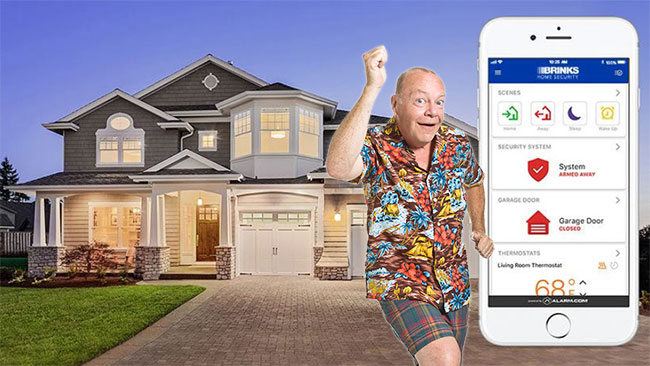
Brinks Home Security is another pro security company. You get the same equipment as the others:
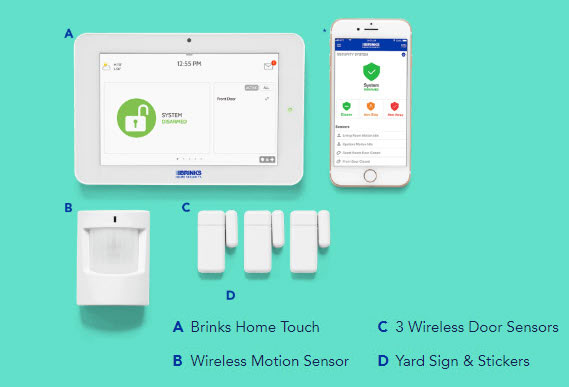
There are two basic packages:
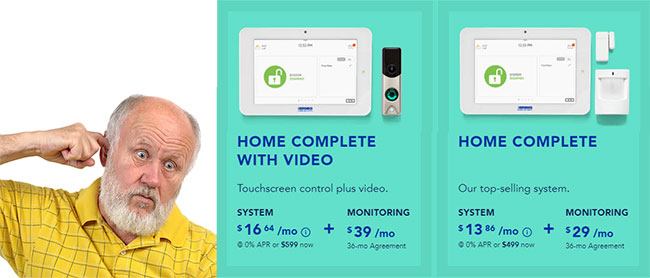
Standard contracts are for 36 months. Both plans come with financing options.
| Plan | Monthly Price | Equipment Cost |
|---|---|---|
| Home Complete | $29 | $399 |
| Financed Home Complete | $40.08 | Free |
| Home Complete with Video | $39 | $499 |
| Financed Home Complete Video | $52.86 | Free |
How Brinks Security works
In case your alarm goes off, you will first receive notifications through your mobile app. Then a Brinks staff member will call your emergency contacts. After that a text will send to emergency contacts, with a link to a group chat.
Pros
Many Smart add-ons are available. These include a smoke detector, glass break sensor, video doorbell and keychain remote.
Cons
Brinks cancellation policy is brutal. You can cancel within 30 days. Cancelling after that obliges you to pay off the full balance of your 36-month contract.
Conclusion
These company reviews give a good idea of what to expect from professional home security. In all cases expect up-front costs and lengthy contracts.
For that price, you get sensors around your home. If triggered, you will receive a notification on your phone. A company rep will also call your emergency contacts.
There are a few things to complain about with these companies. First, all packages are expensive. Second, contracts last for at least three years, with limited cancellation options.
Third, all companies have aggressive sales. They will use buzzwords to confuse you and upsell once you are vulnerable.
Finally, what you will get is an underwhelming, annoying experience. After making such a deep investment, most people buy more (expensive add-ons). They hope to salvage the idea and get positive use out of it.
The best way to do so, in our opinion is to forego big companies and seek DIY home security solutions instead.

